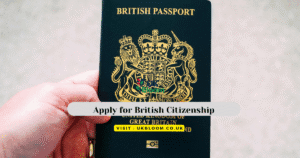What is the Continuous Residence Requirement?
The continuous residence requirement is a vital part of many UK immigration and citizenship applications, including Indefinite Leave to Remain (ILR) and British citizenship. It ensures applicants have genuinely made the UK their primary home and haven’t spent excessive time abroad.
Let’s break it down in simple, human terms: the UK Home Office wants to know that you’ve actually been living in the UK and not just “on paper.”
Table of Contents
Why It Matters
If you’re applying for:
- ILR (after 5 years of a qualifying visa route),
- British citizenship (after holding ILR),
…you’ll need to meet this rule. Failing to meet the continuous residence criteria could result in delays, rejections, or the need to restart your qualifying period.
How is Continuous Residence Measured?

ILR Applications
To qualify for ILR, you generally must not have:
- Been outside the UK for more than 180 days in any 12-month period during your qualifying 5 years.
- Broken your continuous lawful stay by leaving the UK and returning under a different visa type.
British Citizenship Applications
For British citizenship, the rules are slightly different:
- You must not have been outside the UK for more than 450 days in the last 5 years.
- You must not have been outside the UK for more than 90 days in the last 12 months before your application date.
If you’re married to a British citizen, the 5-year requirement may not apply, but the 90-day limit in the last 12 months still stands.
Key Terms Explained
Absences from the UK
Every day you’re out of the UK counts — even weekends or short trips. The Home Office will check your travel history, so it’s essential to keep a detailed record of your departures and arrivals.
Breaks in Continuous Residence
You may break your continuous residence if:
- You spent more than the allowed time outside the UK.
- You returned on a different type of visa that resets your qualifying period.
- You were deported or left under removal directions.
Exceptions to the Rule
The Home Office can exercise discretion in exceptional circumstances. You may still qualify if:
- You had to travel for compassionate reasons (e.g. a family bereavement).
- Your work required frequent travel and you can prove that the UK remained your main base.
- The pandemic or other force majeure events disrupted your travel plans.
Always provide strong documentation if you’re claiming an exception.
What Documents Prove Continuous Residence?
To demonstrate your continuous residence, you’ll need:
- Entry and exit stamps in your passport
- Travel history printout from UKVI (if available)
- P60s, payslips, or employment letters
- Tenancy agreements, council tax bills, or utility bills
- GP or NHS registration letters
It’s wise to build a clear timeline that matches your absences and ties you to a UK address and job, if applicable.
What if You Exceed the Allowable Absences?
If you’ve spent:
- Over 180 days in a 12-month period (for ILR), or
- Over 450 days in 5 years / 90 days in the last year (for citizenship),
…your application may be refused unless you can provide a valid explanation. You may need to delay your application until your absence total falls within acceptable limits.
Tips to Maintain Continuous Residence
- Track your travel: Use a spreadsheet, calendar, or even airline emails.
- Avoid unnecessary long trips: Especially close to your application date.
- Keep UK ties strong: Maintain bank accounts, bills, and employment contracts.
- Apply when ready: If you’re close to a limit, wait a few months to fall within threshold.
Impact on Different Visa Routes
Different routes (Skilled Worker, Spouse, Innovator, etc.) may have specific nuances, but all ILR-eligible routes require careful tracking of continuous residence.
Some visas like the Global Talent Visa allow for more flexibility in travel, but it’s still important to maintain a UK base and document your absences.
Internal Links Section
- Skilled Worker Visa Points Calculator
- Visa Eligibility Calculator
- British Citizenship Guide 2025
- Childcare & Schooling Calculator
External Resources
Disclaimer
This content is for informational purposes only and does not substitute professional legal advice. Immigration regulations may change. Always refer to official UK government sources or consult a qualified immigration advisor for specific advice.
Conclusion
Meeting the continuous residence requirement is one of the most crucial steps on your journey to becoming a permanent resident or British citizen. A few missed days or unrecorded trips can delay your application, so keeping track and planning ahead is essential. Think of it as proving your loyalty — not just with paperwork, but with your physical presence.
FAQs
1. Do weekends abroad count against continuous residence?
Yes. Any full day spent outside the UK counts as an absence, including weekends and short holidays.
2. Will work-related travel affect my application?
It might, but if you can prove your UK base and justify the travel, discretion can be applied.
3. Can I include time on a student visa towards continuous residence?
Only if that visa is part of a qualifying ILR route. Not all visas count.
4. How strict are the 90-day rules for citizenship?
Quite strict. Exceptions are rare and must be backed by serious documentation.
5. Can I reset my 5-year ILR clock by leaving the UK for too long?
Yes. Exceeding 180 days in any 12-month period can break the continuous residence chain.







One thought on “Continuous Residence Requirement Explained: UK Bloom”